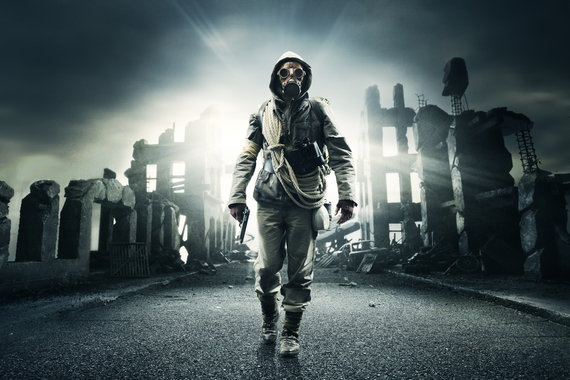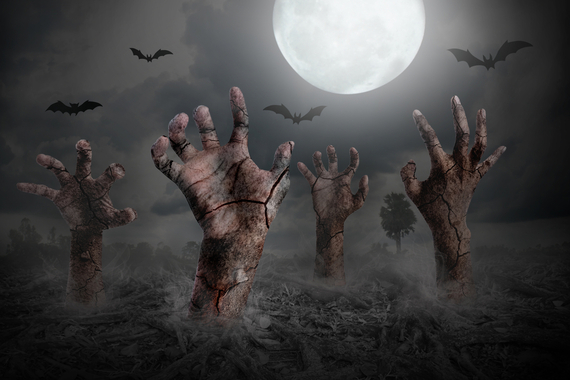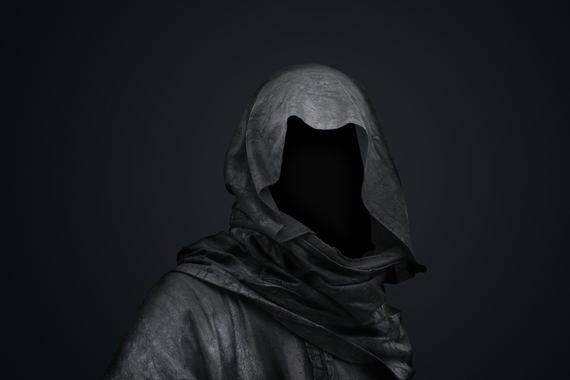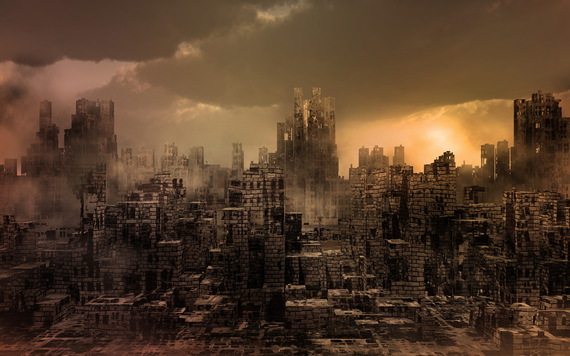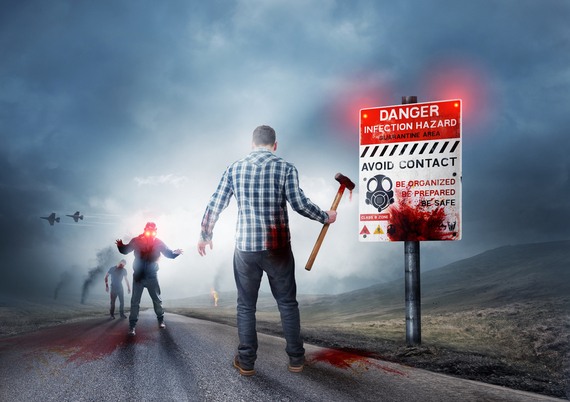By Dr. Angel Morgan via DreamsCloud.com
(1) Zombies have always been an integral part of pop culture, and even more so now with the epidemic (pun intended!) success of The Walking Dead, in which the recent season five premiere garnered an impressive 17.3 million views.
But did you know that there are hundreds and thousands of dream reports online about zombies, the zombie apocalypse, and The Walking Dead? Fans of the show also report dreams about specific characters from The Walking Dead, such as Rick Grimes or Daryl Dixon. Many of those dreams posted online come from people who are interested in learning about what a dream like that could mean.
When my teenaged daughter and son first asked me to watch the pilot of The Walking Dead (2) I was resistant, because these days I don't usually enjoy watching horror as a genre. I also don't usually enjoy shows that portray bleak, apocalyptic futures... mainly because I prefer to imagine a much better future than is often portrayed by Hollywood.
But my children know me very well, so they said, "Mom, just think of it like a dream..." which was a very good (and not too overused) hook. In season one, episode three of The Walking Dead, Rick says, "For a while I thought I was trapped in some coma, dream, something I might not wake up from, ever." (3) I finally agreed to watch the show, and my kids were right. Yes, the pilot was extremely gory and intense, but I soon discovered that The Walking Dead has a lot to offer dreamers with its rich, transformative symbolism, powerful archetypes, and even potential dream allies.
In season one, episode four, Dale asks, "Jim, do you know why you were digging? Can you say?" Jim answers, "Had a reason, don't remember. Something I dreamt last night..." Later, Jim realizes he had an extraordinary precognitive dream when he says, "I remember my dream now -- why I dug the holes." (4) Which was to bury their friends and loved ones who were killed shortly after his dream, by "walkers" (aka: zombies).
To understand dreams about zombies, and a "zombie apocalypse," first it's important to understand a few general things regarding dreams about death, and "the end of the world" in dreams. Ruling out extraordinary dreams about death that are: precognitive (before it happens in waking life), clairvoyant (witnessed in real time as with remote viewing) (Krippner et al., 2002) or effects from PTSD (post-traumatic stress disorder) (Paulson & Krippner, 2007) -- most ordinary dreams and nightmares about death tend to be metaphorical in nature, not literal.
For now, I will mainly refer to those kinds of dreams -- the ones that often use death as a metaphor for dramatic change and transformation in a dreamer's waking life.
Dreams of Death
1.Anything that "die" in an ordinary dream, the dreamer usually associates with something negative that the dreamer wants or needs to transform. "Death" in dreams often symbolizes this inner transformation, and is actually a healthy process when understood in the right way.
2.Positives don't usually die in these kinds of dreams, only negatives. It takes a bit of introspection to figure out what negative associations we carry into our sleep, especially about people we love and consider generally positive in waking life. If someone dies in a dream, there is usually a negative association the dreamer is transforming -- so the process itself is most often healthy and positive.
3.Complete transformation in "death" dreams is ideal, bringing negative associations back as positive ones, and not leaving a bunch of "dead weight" behind in one's dreamscape. This can be better achieved the more lucid (aware of dreaming while dreaming) one is in dreams (Love, 2013), but it can also be achieved by using dream re-entry techniques (Waggoner, 2009).
Dreams of Apocalypse
1.Apocalyptic, "end of the world" dreams and nightmares can also be looked at metaphorically. In my experience, these kinds of dreams are often dreamed by adolescents, young adults, and other people going through rapid, dramatic changes or transitions in their lives -- when one's "whole world is changing" and transforming into a new phase. They are often accompanied by a significant emotional and spiritual growth spurt, and have a profound impact on one's development.
2.It's important to visualize bringing the whole world back in a healthy state after "end of the world" dreams. This kind of visualization helps complete the transformation from a "negative" state to a "positive" one, and generally restores a sense of intactness for the dreamer.
In the story of The Walking Dead, just like in dreams, it is not always clear if someone is an enemy, or an ally. For example, in season two, episode one, Andrea says to Dale, "All I wanted was to get out of this horrific nightmare we live in every day. You took that away from me." (9) Although Dale saved her life, her perception is that he has wronged her. Thinking of this story as if it were a dream, and considering "death" as a metaphor, would he have been a better friend if he had allowed her to take her life? Or, was he truly her ally for stepping in and saving her? Dreams often present us with this kind of dilemma, and only the dreamer holds the final answers each and every time.
Zombies are often referred to as "the un-dead." They are stuck in a morbid "death" state because their transformation isn't complete. In dreams, zombies can represent negative attachments and bad habits that 'just won't die' in waking life -- even when the dreamer knows it is in her or his best interest to let them go.
In season two of The Walking Dead, Hershel kept a barn full of "walkers" because he struggled with letting these "negatives" go. He had attachments to what they once were (his wife, son, and community), and he refused to see them for what they had become -- dangerous to those who were still living. When Shane opened the barn and led an armed attack on the "walkers" was he being a troublemaker, an ally, or both? As tense and emotional as the zombie massacre was, the characters eventually all felt relief after they were killed off. If it were a dream, transforming dead zombies in the form of a bonfire is brilliant. Doing that wouldn't leave behind any "dead-weight" for the dreamer to carry around.
When we think about the potential metaphors at play, what is the appeal of dreaming about zombies, survivors, and a zombie apocalypse? The same appeal The Walking Dead offers: Feeling more empowered in the midst of change when getting rid of "negatives," fighting "bad habits" and surviving them, transforming outdated ways of being in the world, and banding together with allies to attempt to re-birth and recreate a new way of being in the world. A way that includes resiliency, tough moral choices, interesting characters, and intense relationships!
Dreams are not always what they seem, but that doesn't mean they don't mean anything. In a culture that severely lacks dream education, puzzling them out to find meaning can require a certain amount of commitment and dedication from the dreamer... Not unlike the commitment and dedication to survive, modeled for us by characters on The Walking Dead.
DreamsCloud is the world's leading online dream resource, with an interactive database of more than 1.8 million dreams. Offering a 360-degree approach to dreaming -- including a real-time global dream map, dream journaling/sharing tools and the largest group of professional dream reflectors -- DreamsCloud empowers users to better understand their dreams and improve their waking lives. They offer a free app for iOS called DreamSphere and curate one of the largest available online dream dictionaries.
Blog author Angel Morgan, Ph.D., completed the Dream Studies and Creativity Studies programs at Saybrook University. Her research can be found on academia.edu. Dr. Morgan also oversees the experienced dream reflectors at DreamsCloud, providing feedback and insight for dreams submitted by users worldwide.
References
1.Carter, B. (2014, October 14). 'Walking Dead' Season 5 Draws 17 Million Viewers in Premiere, a Record for a Cable TV Drama. In The New York Times. Retrieved October 21, 2014.
2.Darabont, F. (Writer/Director). (2010). Days Gone Bye [Television series episode]. In D. Alpert, F. Darabont, C.H. Eglee, G.A. Hurd, & R. Kirkman (Executive producers), The Walking Dead. New York, NY: AMC.
3.Eglee, C.H., LoGiudice, J., & Darabont, F. (Writers), & Horder-Paynton, G. (Director). (2010). Tell It to the Frogs [Television series episode]. In D. Alpert, F. Darabont, C.H. Eglee, G.A. Hurd, & R. Kirkman (Executive producers), The Walking Dead. New York, NY: AMC.
4.Darabont, F., & Kirkman, R. (Writers), & Renck, J. (Director). (2010). Vatos [Television series episode]. In D. Alpert, F. Darabont, C.H. Eglee, G.A. Hurd, & R. Kirkman (Executive producers), The Walking Dead. New York, NY: AMC.
5.Krippner, S. Bogzaran, F., & de Carvalho, A. P. (2002). Extraordinary dreams and how to work with them. New York: State University of New York Press.
6.Paulson, D. S., & Krippner, S. (2007). Haunted by combat: Understanding PTSD in war veterans including women, reservists, and those coming back from Iraq. Santa Barbara, CA: Praeger Security International.
7.Love, D. (2013). Are you dreaming?: Exploring lucid dreams a comprehensive guide. N.p.: Enchanted Loom Publishing.
8.Waggoner, R. (2009). Lucid dreaming: Gateway to the inner self. Needham, MA: Moment Point Press.
9.Darabont, F., & Kirkman, R. (Writers), Dickerson, E. & Horder-Paynton, G. (Directors). (2010). What Lies Ahead [Television series episode]. In D. Alpert, F. Darabont, C.H. Eglee, G.A. Hurd, R. Kirkman, & G. Mazzara (Executive producers), The Walking Dead. New York, NY: AMC.
